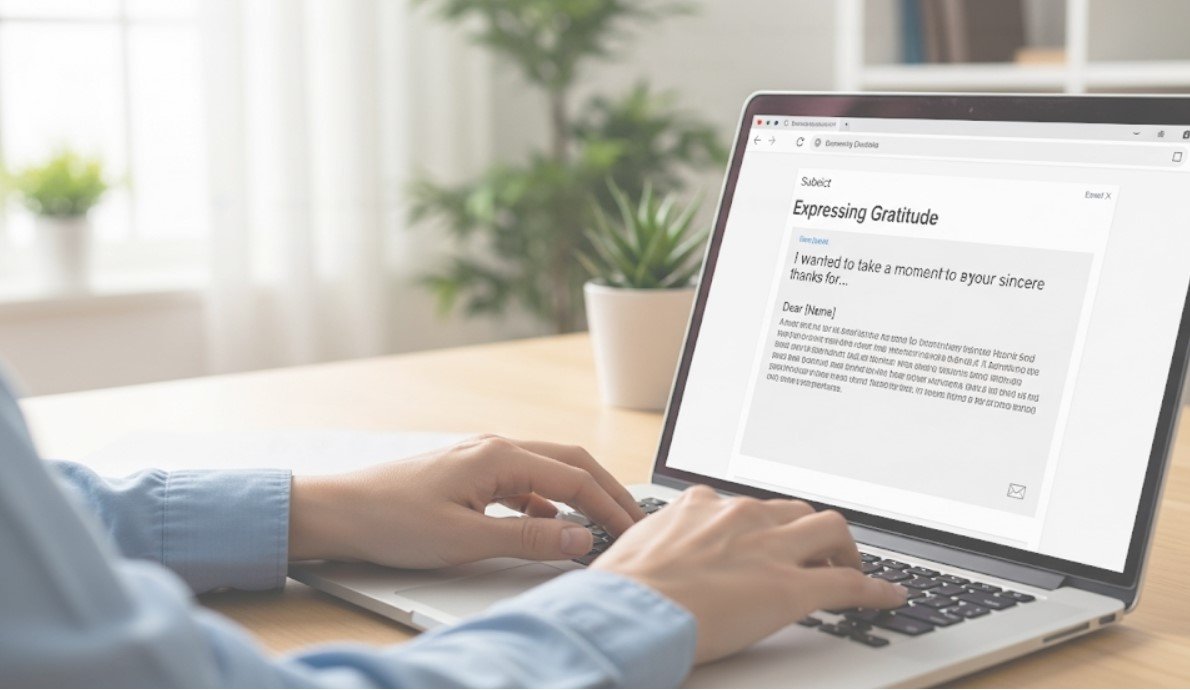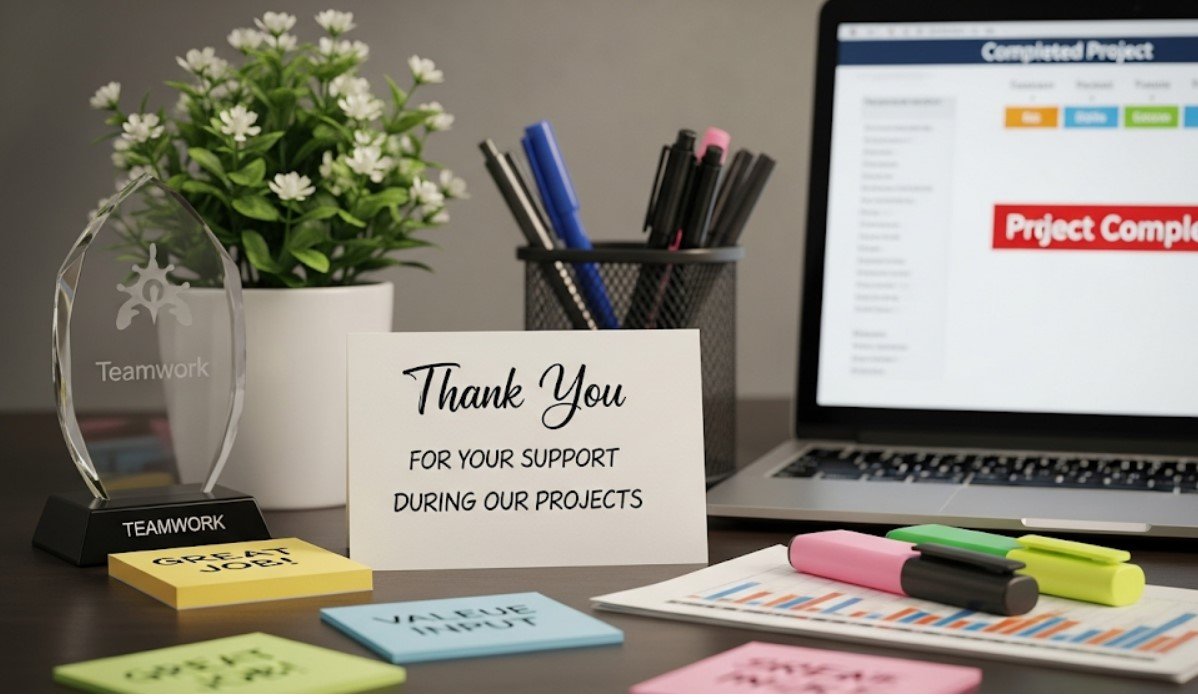Expressing gratitude professionally can strengthen relationships in the workplace. It shows appreciation and respect.
In professional settings, words matter. Saying “thank you” properly can leave a lasting impression. It can also build a positive environment. Whether you’re replying to a colleague’s support or acknowledging a client’s concern, finding the right words is crucial. This guide will help you convey your gratitude with 22 different ways to say, “Thank you for your concern.
” Each method is designed to fit various professional scenarios, ensuring you always have the perfect response. Read on to discover how to express your appreciation with sincerity and professionalism.
Expressing Gratitude In Emails

Expressing gratitude in emails is crucial in professional settings. It shows appreciation and builds stronger relationships. Responding to someone’s concern with a thoughtful thank you can make a big difference. Here are some ways to express gratitude professionally in your emails.
Acknowledging Concern
Start by acknowledging the concern. Show that you have read and understood their message. For example, “Thank you for bringing this to my attention.” This simple line can convey respect and appreciation.
Another way to acknowledge concern is to mention the specific issue. Say, “I appreciate your concern about the project deadline.” Specificity shows you are engaged and value their input.
Using A Warm Tone
Using a warm tone can make your email feel more personal. Start with a friendly greeting like “Hi” or “Hello.” Use words that convey kindness and respect.
For instance, “Thank you for your thoughtful email.” This phrase feels warm and genuine. Ending your email with a warm closing can also leave a positive impression. Consider phrases like “Best regards” or “Warm wishes.”
Remember, a warm tone can make your gratitude feel more sincere. It helps in building a friendly and professional relationship.
Thank You Notes For Colleagues
Showing appreciation to your colleagues strengthens professional relationships. It’s important to acknowledge their support and concern. Here are some ways to say “Thank you for your concern” professionally.
Personal Touch
Adding a personal touch to your thank you note makes it more heartfelt. It shows you value their support. Here are some examples:
- “Thank you for your concern during the project. Your advice was invaluable.”
- “I appreciate your help and concern regarding the recent challenges. It means a lot.”
- “Your concern during the meeting was very thoughtful. Thank you.”
These notes not only thank your colleague but also recognize their specific actions.
Keeping It Brief
Sometimes, a short and sincere note is enough. Here are some brief examples:
- “Thank you for your concern. It helped a lot.”
- “I appreciate your support and concern.”
- “Thanks for your concern. I feel supported.”
These brief notes are direct yet meaningful. They save time while still expressing gratitude.
Responding To Managers
Responding to your manager’s concern requires a professional and thoughtful approach. This shows respect and appreciation for their guidance. It also strengthens your professional relationship.
Showing Appreciation
Express gratitude directly and clearly. Start by thanking your manager for their concern. Phrases like “Thank you for your concern” or “I appreciate your support” work well. These phrases show that you value their input.
Next, acknowledge the specific concern they raised. This shows that you listened and understood their point. For example, “I appreciate your concern about the project timeline.” This demonstrates that you are engaged and attentive.
Professional Language
Maintain a professional tone in your response. Avoid casual language or slang. Use formal phrases like “I will take your advice seriously” or “I will ensure to address this issue promptly.” These phrases convey respect and professionalism.
Keep your response concise and to the point. Long-winded responses can seem unprofessional. Aim to communicate your message clearly and efficiently.
Finally, express your commitment to action. Let your manager know how you plan to address their concern. For example, “I will review the project plan and make necessary adjustments.” This shows that you are proactive and responsible.
Saying Thanks In Meetings
Meetings are a common setting in professional environments. Expressing gratitude during meetings can build rapport and foster positive relationships. Knowing how to say “Thank you for your concern” professionally can make a lasting impression. Here are effective ways to convey your appreciation during meetings.
Verbal Acknowledgment
Speak directly to the person who showed concern. Use clear, concise language. For example, “Thank you for your concern about this project.” This simple statement shows appreciation and acknowledges their effort. Another way is to say, “I appreciate your input during the meeting.” This highlights their contribution. Be genuine in your tone to show sincerity.
Positive Body Language
Body language speaks volumes in meetings. Maintain eye contact with the person you are thanking. Smile warmly to convey genuine appreciation. Nod your head slightly to show agreement and respect. Lean slightly forward to show engagement and interest. These gestures reinforce your verbal acknowledgment and create a positive atmosphere.
Writing A Formal Letter
Writing a formal letter to express gratitude for someone’s concern is an effective way to maintain professional relationships. A well-crafted letter can convey your appreciation clearly and respectfully. Below, we’ll explore the key components of a formal letter, focusing on structured format and polite closing.
Structured Format
A formal letter should follow a structured format to ensure clarity and professionalism. Start with your contact information at the top, followed by the date. Below the date, include the recipient’s contact information. Use a formal salutation like “Dear [Name],” to address the recipient.
In the body of the letter, begin with a clear statement of gratitude. Mention the specific concern or assistance provided. Keep each paragraph concise and to the point. This helps the reader understand your message easily. End the body with a summary of your appreciation and any additional comments.
Polite Closing
Conclude your letter with a polite closing. Use phrases like “Sincerely,” or “Best regards,” followed by your full name. Include your job title and company name below your signature if applicable. This adds a professional touch to your letter.
Review your letter for any errors or unclear statements. A well-written letter reflects your professionalism and strengthens your business relationships.
Using Company Communication Channels
Using company communication channels to express gratitude shows professionalism. It fosters better relationships within the workplace. These channels provide effective ways to convey appreciation.
Intranet Messages
Intranet messages are a formal way to say thank you. They reach many employees at once. You can write a clear, concise message to show appreciation. This method ensures your gratitude is documented. It also reflects positively on your work ethic.
For example, “Thank you for your concern regarding the project delay. Your input is valued.” Simple yet effective. It acknowledges the person’s effort and concern.
Team Chat Platforms
Team chat platforms offer a more informal way to say thanks. These platforms, such as Slack or Microsoft Teams, encourage quick communication. You can send a direct message or post in a group chat.
For instance, “Thanks for your concern about the client issue. I appreciate your support.” This creates a friendly atmosphere. It also helps build stronger team connections.
Thank You For Support During Projects

In the professional world, expressing gratitude for support during projects is crucial. It builds strong relationships and fosters a positive work environment. A simple “thank you” goes a long way, but adding specifics can make your appreciation more impactful. Here are some ways to say “thank you” professionally for support during projects.
Specific Contributions
Recognizing specific contributions makes your gratitude more meaningful. It shows you noticed and valued their efforts. Here are a few examples:
- Thank you for your detailed analysis during the project. Your insights were invaluable.
- Your creative solutions helped us overcome significant challenges. I appreciate your innovation.
- Thank you for your timely updates. They kept the project on track.
Highlighting specific contributions not only expresses gratitude but also motivates continued excellence.
Future Collaboration
Expressing interest in future collaboration shows you value the professional relationship. It encourages continued support and teamwork. Consider these phrases:
- Looking forward to working with you on future projects.
- Your expertise will be crucial in our upcoming initiatives. Thank you in advance.
- Excited to collaborate with you again soon. Your support is always appreciated.
By mentioning future collaboration, you strengthen your professional bond and create opportunities for further success.
| Phrase | Context |
|---|---|
| Thank you for your detailed analysis | For recognizing analytical skills |
| Your creative solutions | For appreciating innovative problem-solving |
| Looking forward to working with you | For expressing interest in future collaboration |
Expressing Gratitude To Clients
Expressing gratitude to clients is crucial for building strong relationships. It shows appreciation and fosters trust. A simple thank you can go a long way. Here are some professional ways to say “Thank you for your concern” to clients.
Client-focused Language
Using client-focused language helps clients feel valued. Phrases like “We appreciate your feedback” or “Your input is valuable to us” can make a big difference. It shows that you listen and care about their opinions. This approach builds a positive rapport.
Another way to express gratitude is by acknowledging their concerns. Say, “Thank you for bringing this to our attention.” It shows you take their concerns seriously. This can enhance client satisfaction. Always be sincere and genuine in your responses.
Encouraging Future Business
Expressing gratitude can encourage future business. Use phrases like “We look forward to continuing our partnership.” It shows you value the ongoing relationship. This can lead to repeat business and referrals.
Another effective phrase is, “Your satisfaction is our priority.” This reassures clients of your commitment. It also builds trust and loyalty. Keep your language positive and forward-looking. Clients appreciate knowing you value their business.
Thank You Phrases
Saying “thank you for your concern” is essential in professional settings. It shows appreciation and maintains good relationships. Let’s explore various ways to express your gratitude.
Formal Expressions
Formal expressions are suitable for official emails and professional environments. They convey respect and politeness.
- Thank you for your concern. I appreciate your support.
- I am grateful for your concern and understanding.
- Your concern means a lot to me. Thank you for your kindness.
- Thank you for your considerate message. It is much appreciated.
- I sincerely appreciate your concern. Your support is invaluable.
Casual Alternatives
Casual alternatives work well in less formal settings. They are friendly yet respectful.
- Thanks for your concern. It means a lot.
- I appreciate you checking in. Thanks for your support.
- Thanks for thinking of me. It’s very kind of you.
- Your concern is appreciated. Thanks a bunch.
- Thanks for your care. It really helps.
Acknowledging Personal Situations

In our professional lives, there are times we need to acknowledge personal situations. Colleagues and clients often express concern for our well-being during such times. It’s important to know the right way to respond. Here, we explore different ways to say “Thank you for your concern” in a professional setting.
Health Concerns
Dealing with health issues is never easy. When someone shows concern, it’s polite to respond appropriately. Here are some professional ways to acknowledge their concern:
- Thank you for your kind words. I appreciate your concern.
- I am grateful for your support during this time.
- Thank you for reaching out. Your concern means a lot.
- Thank you for your understanding and patience.
- I appreciate your empathy and support.
Family Matters
Family matters can sometimes affect our work life. It’s important to acknowledge the concern shown by colleagues or clients. Here are some ways to do so:
- Thank you for your understanding and support.
- I appreciate your concern for my family situation.
- Thank you for your patience during this challenging time.
- I’m grateful for your kind words and support.
- Thank you for being so understanding.
Timing Your Gratitude
Expressing gratitude is important in professional settings. The timing of your thanks can make a huge difference. Well-timed appreciation shows respect and enhances your professional relationships. Let’s explore the best times to say “Thank you for your concern”.
Immediate Response
Responding quickly shows you value the other person’s concern. An immediate response is often seen as more genuine. Here are some examples:
- “Thank you for your concern. I appreciate your quick response.”
- “I received your message. Thank you for your concern.”
- “Your prompt concern means a lot to me. Thank you.”
These responses are simple yet effective. They show you are attentive and appreciative.
Follow-up Thanks
A follow-up thank you can reinforce your appreciation. This is useful in longer-term interactions. Here are some ideas:
- “I wanted to thank you again for your concern last week.”
- “Your concern really helped me. Thank you once more.”
- “I appreciate your ongoing concern. Thank you.”
Follow-up thanks show you have not forgotten their kindness. It strengthens your professional bond.
Cultural Considerations
Understanding cultural considerations is crucial when expressing gratitude professionally. Different cultures have unique ways of showing appreciation and concern. Being aware of these norms can foster better communication and strengthen relationships. In this section, we will explore some important cultural aspects to keep in mind.
Understanding Norms
Cultural norms influence how gratitude is expressed. In some cultures, a simple “thank you” is enough. In others, more elaborate expressions are expected. For instance, in Japan, a bow often accompanies a thank you. In Germany, a firm handshake might be the norm. Understanding these differences helps avoid misunderstandings.
Respectful Language
Using respectful language is essential in professional settings. Tailor your words to fit the cultural context. In countries like India, adding titles such as “Sir” or “Madam” shows respect. In contrast, using first names is common in the United States. Always consider the recipient’s cultural background.
Also, be mindful of formalities. Some cultures prefer formal language. Others might find it too stiff or distant. For instance, in France, using “vous” instead of “tu” shows respect. In Brazil, informal language is more acceptable. Adapting your language to the audience’s culture demonstrates sensitivity and respect.
Frequently Asked Questions
How Do You Professionally Thank Someone For Their Concern?
Express gratitude with a concise, sincere message. Use phrases like “I appreciate your concern” or “Thank you for your support. “
What Are Formal Ways To Say Thank You?
Use expressions like “I am grateful for your concern” or “Your support is much appreciated. “
Can I Thank Someone For Their Concern Via Email?
Yes, an email is a professional way. Keep it brief and appreciative, using polite language.
Is It Appropriate To Thank A Boss For Their Concern?
Absolutely. Acknowledging a boss’s concern shows respect and appreciation for their support and guidance.
Conclusion
Expressing gratitude professionally is essential in any workplace. These 22 phrases offer variety. They help convey your appreciation effectively. Use them to show genuine thanks. Your colleagues will notice and value your respect. Practicing these responses can improve workplace relationships.
It can also enhance your communication skills. Showing gratitude fosters a positive environment. So, use these phrases often. Make “thank you” a regular part of your vocabulary. It creates a more supportive and productive workplace.


